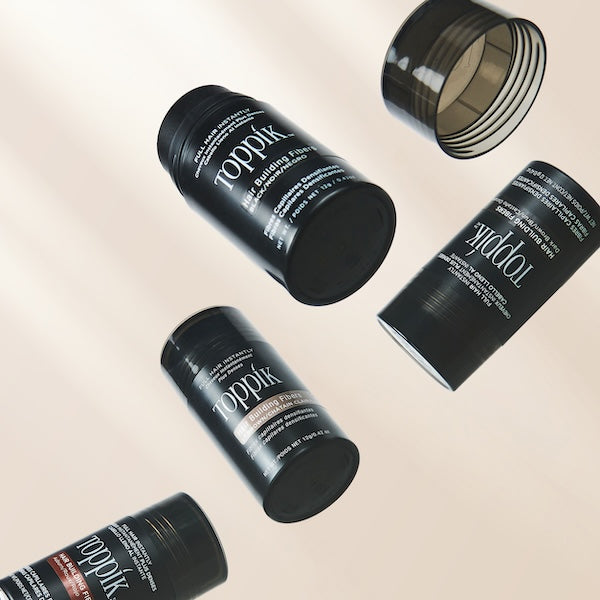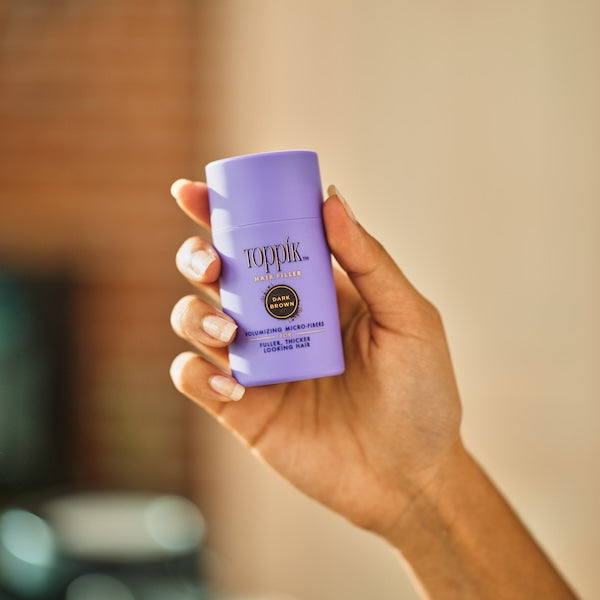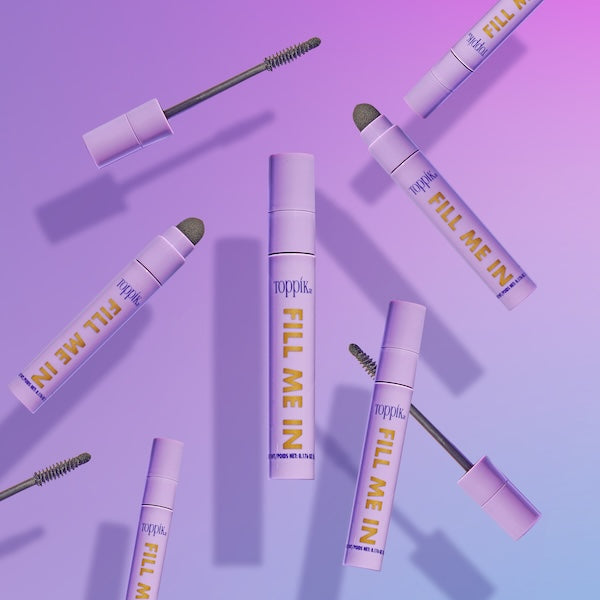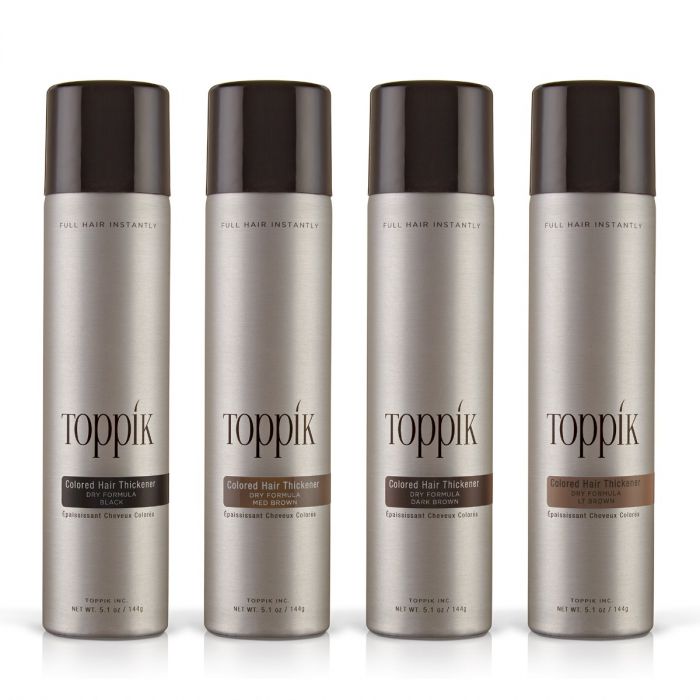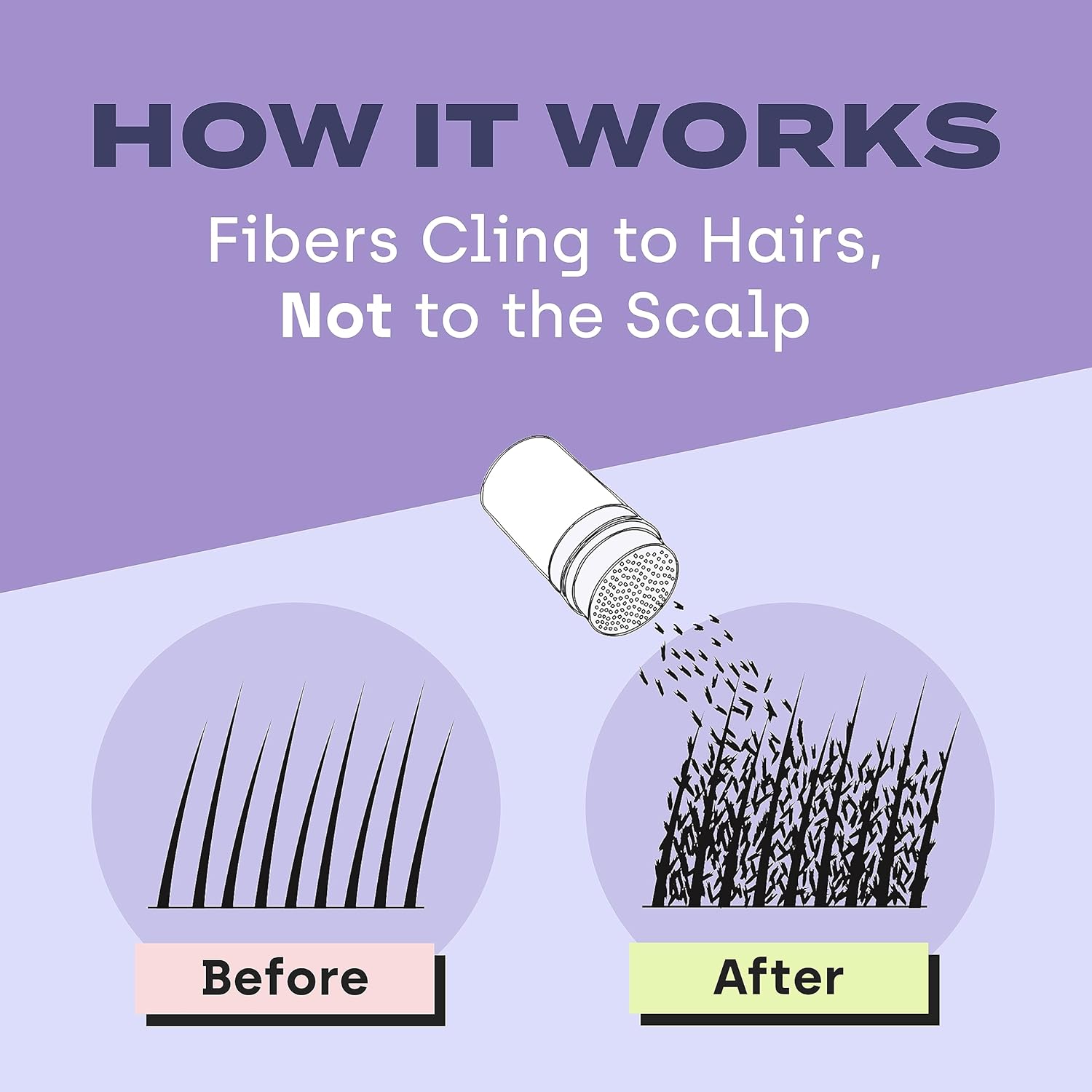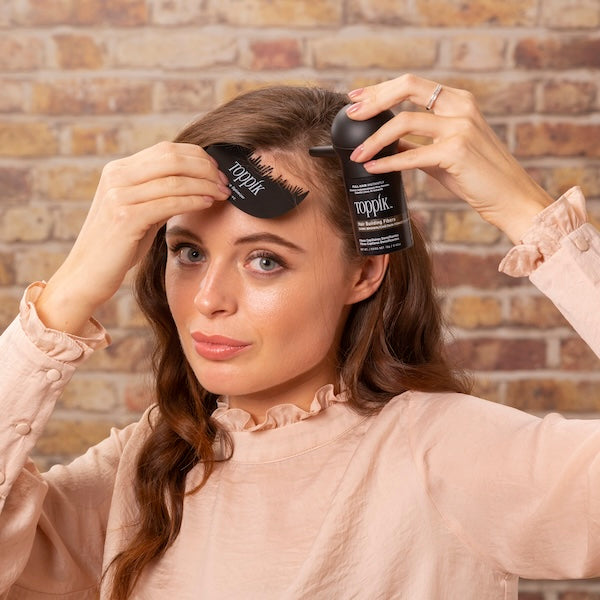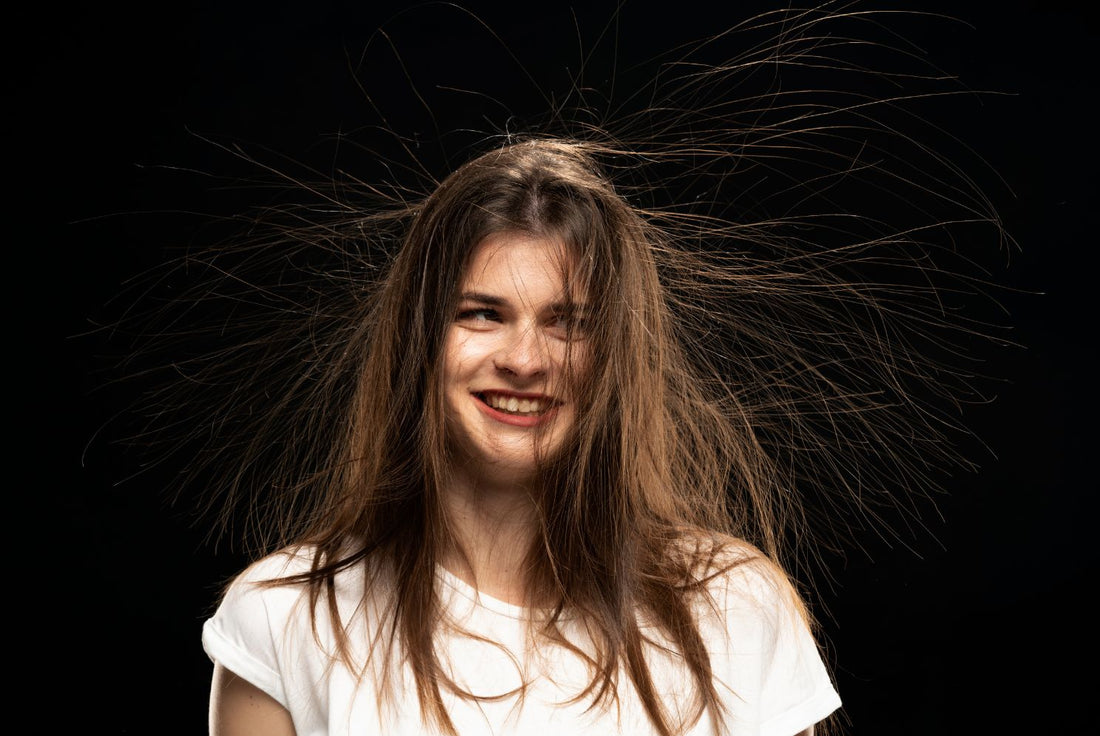There is a lot to love about winter. Cozy sweaters, holiday movies, and hot cocoa all come to mind. But winter also brings an unwanted guest: unruly, staticky hair. You may find yourself wondering, “Why is my hair so staticky in winter?” The science behind winter hair troubles is simple: cold winter air contains less moisture than warm air. When the humidity drops, your hair loses its natural moisture balance and becomes susceptible to static electricity. This creates the perfect storm for those annoying flyaways and frizz that seem impossible to tame.
If you’re battling static electricity and frizz during the colder months, you’re not alone. These common winter woes can leave even the most well-maintained hair looking wild and unmanageable. Keep reading for our complete guide on how to tame static hair in winter.
Why Winter Wreaks Havoc on Your Hair
Static electricity occurs when there’s an imbalance of electric charges within or on the surface of a material. Have you ever been shocked by a doorknob after walking across the carpet in socks? It’s the same thing. But what does this mean for your hair? Three main factors come into play.
Dry Air Is the Culprit
In winter’s dry conditions, the built-up electrical charges in your hair don’t dissipate easily, causing individual strands to repel each other and create that dreaded “floating” effect. Plus, the dry air strips your hair of essential moisture. This moisture loss leads to dry, brittle, lightweight strands that are more prone to static and frizz.
The Friction Factor
When it comes to hair, static happens when electrons transfer between your hair and another surface through friction – like when you remove a hat or run a brush through your hair. Wool hats, scarves, and even regular brushing create friction that builds up static electricity. This friction, combined with dry air, makes your hair more likely to stand on end and resist styling attempts.
Heat Styling Difficulty
Winter often tempts us to reach for head styling tools more frequently. After all, it seems to make sense that straightening your hair will help rid it of frizz. However, excessive heat styling can further strip your hair of moisture, creating a cycle of dryness that exacerbates static and frizz.
Does Dry Scalp Cause Static Hair?
Yes, a dry scalp can contribute to static hair problems. When your scalp lacks moisture, it can’t produce enough natural oils to keep your hair properly hydrated. This lack of hydration makes your strands more susceptible to static electricity. If you experience dry skin on your face and hands during the winter, your scalp is likely dry as well.

Essential Products to Combat Static and Frizz
Static hair is annoying, but the good news is that the right hair care products can make a significant difference in managing your winter hair challenges. Generally, it’s a good idea to focus on products that restore hydration to dry winter hair.
Hydrating Shampoo & Conditioner
For example, using a hydrating shampoo and conditioner can help restore some of the moisture lost in winter, protecting your hair against static electricity. We recommend Viviscal Thickening Shampoo and Viviscal Strengthening Conditioner. When used together, this duo strengthens hair and reduces breakage.
Hair Oil or Serum
Hair oils and serums can provide a protective barrier against winter’s harsh elements while taming flyaways and adding shine. Viviscal Hair Thickening Serum is a lightweight, leave-in conditioner that coats each hair strand to reduce frizz. When used alongside Viviscal Thickening Shampoo and Strengthening Conditioner, it helps create thicker, fuller-looking hair. Apply it to clean, damp hair, or rub a small amount between your hands, then smooth away flyways.
For more comprehensive winter hair care tips, check out our article “Winter Hair Care Tips You Need Now”.

Smart Styling Strategies for a Frizz-Free Winter
1. Limit Heat Styling
Put down the flat iron! In the winter, it’s a wise idea to give your hair a break from heat styling when possible. As we mentioned before, heat styling dries out the hair and leaves it more prone to static and breakage. Embrace heat-free styling methods or wear your natural hair texture. When you do use heat tools, always apply a heat protectant first to minimize damage. You can also extend the time between wash days (and thus how often you need to blow dry your hair) by using dry shampoo before bed.
2. The Right Brush Is Key
Since static is caused by friction between your hair and hair tools, using the right hair tools can significantly reduce static and breakage. Tools made from natural materials are less likely to create a static buildup in your hair. If you’re affected by winter hair, you might consider buying a wood wide-tooth comb or boar bristle brush.
3. Humidify Your Space
Use a humidifier in your bedroom to add moisture to the air. This simple step can make a significant difference in preventing static electricity buildup overnight. Plus, it can help your skin stay hydrated while you sleep. Hint: if you experience static hair in the summer due to air conditioning, a humidifier may also help.
4. Try Argan Oil
If you’re using a hydrating conditioner and still feel like your hair is dry, try mixing in a little bit of argan oil. Put a walnut-sized amount of conditioner in your hand, then add a couple of drops of 100% argan oil. Apply to wet hair, focusing on the mid-length to ends. Let the mixture soak into your hair for about five minutes, then rinse. If you feel your hair is too greasy when dry, add less oil next time. If it’s still dry, add more.
5. Try an Anti-Static Spray
Spraying an anti-static spray on your hair brush before brushing your hair can help reduce static hair. You can also spray it into your hats or onto scarves to prevent static buildup. If you don’t have anti-static spray, you can also try spraying hairspray onto your hairbrush, then brush through your hair to tame flyaways.
6. Use a Leave-In Conditioner
A lightweight leave-in conditioner can also help to add extra hydration to parched winter hair. You can make your own by mixing one tablespoon of your favorite conditioner with one or two tablespoons of water in a spray bottle. Shake to mix, and apply to clean, wet hair, avoiding the roots.
How Can I Get Rid of Static in My Hair Without Washing It?
If you get static hair in between wash days, try one of these quick fixes:
-
Lightly mist your hands with water and smooth them over your hair
-
Gently rub your hair with a dryer sheet
-
Rub a small amount of lotion between your hands, then smooth over your hair to reduce flyaways

6 Lifestyle Changes for Healthy Winter Hair
While taming winter hair challenges from the outside is important, creating healthy hair starts from within. Here are key lifestyle changes that can make a significant difference in your hair’s health and manageability during the cold months.
1. Hydrate from Within
Drinking enough water is crucial for maintaining healthy hair during the winter. Aim for at least eight glasses of water daily to keep your hair hydrated from the inside out.
2. Maintain a Balanced Diet
A diet rich in vitamins and minerals supports healthy hair growth and strength. Focus on foods high in biotin, omega-3 fatty acids, and vitamins A, C, and E.
3. The Power of Silk and Satin
Your sheets may feel smooth, but cotton pillowcases actually have a rough texture that rubs against your hair while you sleep, causing the type of friction that leads to static electricity. Instead, try using a silk or satin pillowcase that allows your hair to glide across the fabric while you sleep with less friction. If you want to keep your pillowcases, consider using a silk or sating hair wrap to protect your hair while you sleep.
4. Manage Stress Levels
Stress can significantly impact your hair health. Even simple activities like taking a daily walk, practicing deep breathing exercises, or setting aside 10 minutes for mindfulness can make a significant difference to your stress levels and, consequently, your hair health.
5. Turn Down the Temperature
We all love a steaming hot shower on cold days, but, alas, taking an ultra-hot shower dries out your hair and skin. Turning down the temperature–even a little bit–can help some of your hair and skin’s natural moisture.
6. Beyond Managing Static and Frizz
Some individuals experience increased hair shedding or thinning during the winter months. If this is a concern, a product like Toppik Hair Building Fibers can provide a cosmetic solution by instantly creating the appearance of thicker, fuller hair.

Winter Hair Care Schedule
To maintain healthy hair throughout the winter season, follow this general care schedule (we’ll provide more detailed advice for specific hair types in the next section).
Daily:
-
Protect hair from harsh weather elements by wearing a hat or scarf when you go out in the cold
-
Use hydrating products that are appropriate for your hair type
-
Minimize heat styling
-
Drink plenty of water
-
Gently detangle hair with a comb or brush designed to minimize static
-
Sleep with a silk or satin pillowcase, or wrap your hair in a silk or satin scarf before bed
Weekly:
-
Apply a deep conditioning treatment formulated for your hair type
Monthly:
-
Evaluate product effectiveness and adjust routine if needed
-
Use a clarifying treatment if experiencing product build-up

Tailored Winter Hair Care Strategies for Every Hair Type
Depending on your hair type, you may need to take a few additional steps to fight back against winter hair.
Fine Hair Winter Tips
Fine hair of all textures is particularly susceptible to static during winter months due to its lightweight nature. However, fine hair is also more prone to limpness, so you don’t want to overdo it with the hydration. Here’s how to keep it under control:
-
Use lightweight moisturizing products that won’t wear hair down, leaving it greasy-looking.
-
Apply a dry shampoo at the roots before bed to absorb excess oil while maintaining volume.
-
Keep static sheets in your bag for emergency touch-ups.
-
Apply products from mid-shafts to the ends, avoiding the roots.
Thick Hair Winter Tips
Even though thick hair is less prone to static than fine hair, it can also become unmanageable during winter. Follow these tips to keep thick hair healthy all winter long:
-
Section hair while styling to ensure even product distribution.
-
Plan ahead for air-drying time to avoid heat damage.
-
Braid thick hair before wearing winter hats or scarves to prevent tangling.
-
Apply products to damp hair to lock in moisture.
Curly Hair Winter Tips
Curly hair requires extra moisture and protection during winter months. Follow these tips to keep curly hair hydrated:
-
Deep condition weekly with a product formulated for curly hair.
-
Apply products to soaking wet hair to lock in moisture.
-
Consider protective styling options like braids rather than heat styling your hair.
-
If you choose to blow dry your hair, use a diffuser to minimize frizz.
-
In between washes, refresh curls with a moisture-rich spray.
Natural Hair Winter Tips
Of all the hair types, natural hair is most prone to dryness and breakage in the winter. Follow these tips to keep natural hair moisturized and strong:
-
If you haven’t already, implement a regular deep conditioning routine with a product designed for your hair type.
-
Use protective styling to minimize exposure to harsh weather.
-
Lock in moisture with the LOC (Liquid, Oil, Cream) method.
-
Choose protective styles that don’t put too much tension on edges, where hair is most brittle and prone to breakage.
Take Control of Your Hair This Winter
With these strategies and products, you can maintain healthy, manageable hair throughout the winter months. Remember that consistency is key – implement these changes into your regular hair care routine for the best results. By taking proactive steps to protect and nourish your hair, you can enjoy beautiful, static-free locks all winter long.

